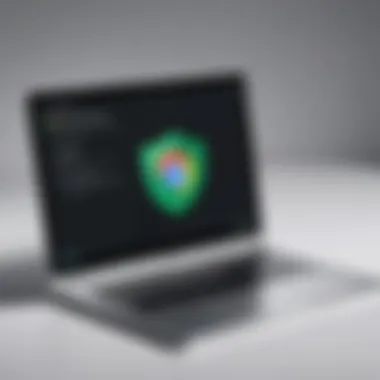Essential Malware Scanners for Chromebook Security


Intro
In today’s digital age, where a click can lead to a world of online threats, securing devices is more crucial than ever. Chromebooks have carved out a niche for themselves as user-friendly, cloud-centric alternatives to traditional laptops, but it's essential to address one significant aspect: malware protection. Understanding how to safeguard these machines from malicious software is paramount for anyone who relies on them for work or personal use. This guide aims to explore the landscape of malware scanners tailored specifically for Chromebook users, helping them navigate a realm filled with potential risks.
Preface to Malware Scanning
In today’s digital age, where data flows more swiftly than water, knowing how to shield your devices from malware becomes not just wise, but essential. Chromebooks are becoming increasingly popular due to their user-friendly interfaces and robust security features. However, understanding how malware can infiltrate even these secure environments is vital for any user. This section serves as an essential prelude, illuminating the need for malware scanning tailored specifically for Chromebook devices, especially as threats become more sophisticated.
With the advent of cloud computing and more individuals relying on these devices for sensitive transactions, the call for effective malware scanning solutions is clearer than ever. Consider this: without adequate protection, any click on an innocuous link could lead you down a rabbit hole of malware infection, compromising your device and your data. Thus, smart Chromebook users must arm themselves with knowledge on malware scanning and its defenses.
- Malware Types: Malware can take many forms—viruses, trojans, ransomware, and spyware—each with unique methods of entrance and operation. Knowing these can help users identify potential threats.
- Benefits of Scanning: Regular use of malware scanners not only helps detect and remove existing malware but also fortifies defenses against new and emerging threats. This proactive approach is crucial for maintaining system integrity.
- Considerations: It’s not just to have any malware scanner; the right choice hinges on specific features, ease of use, and the ability to operate seamlessly with Chrome OS.
As we transition through this guide, we will cover various aspects that make malware scanning indispensable for Chromebook users. Get ready to delve deeper into understanding what malware is, its implications, and how to effectively combat it.
Understanding Malware
Malware stands as an umbrella term for any software designed to harm or exploit any programmable device, network, or service. There’s a vast array of malware types, and grasping the particulars can mitigate risks associated with these threats.
- Viruses: These attachments piggyback on files and programs, spreading when those files are shared.
- Trojans: Disguised as legitimate software, trojans lure unsuspecting users before unleashing damage.
- Ransomware: A more nefarious breed, this malware locks files until the user pays a ransom for access.
- Spyware: Operating under the radar, spyware quietly collects user data like passwords and bank information.
Each type of malware operates differently, and knowing how they function helps users remain vigilant.
The Growing Threat Landscape
The digital realm is in a constant state of evolution, and as technology becomes more integrated into everyday life, the threat of malware grows. Cybercriminals are not resting on their laurels; they’re continually refining their techniques and strategies.
- Increased Attacks: Cyberattacks are not only becoming more sophisticated but also more frequent. A recent study showed that most companies experienced multiple attacks in a year.
- Shift in Tactics: There have been significant shifts in tactics; from phishing attacks that prey on human psychology to advanced persistent threats that lay dormant while gathering critical intelligence.
- Challenges for Chromebook Users: Although Chromebooks are inherently secure due to their architecture, they are not immune to attacks, especially as users rely on installing Android apps or visiting various websites.
"As technology advances, so does the sophistication of cyber threats. Educating oneself about these threats and their defenses isn’t just a precaution; it’s a necessity."
Understanding this threat landscape equips Chromebook users with the knowledge they need to safeguard their devices effectively.
Chromebook and Its Unique Security Features
When considering the digital landscape, Chromebooks stand out not just for their sleek design and portability but also for their robust security features. With the rise in cyber threats, understanding these unique security mechanisms can provide users with peace of mind while surfacing best practices for protection.
Chrome OS Security Architecture
At its core, Chrome OS is built on solid principles that emphasize security without compromising on performance. Rather than relying entirely on traditional antivirus solutions, it utilizes a multi-layered security approach. The foundation consists of the Linux kernel, which gets regular updates and patches. In essence, this means that vulnerabilities are often addressed before they can be exploited.
Another key component is the sandboxing technology that isolates each application, ensuring that if one becomes compromised, it doesn’t affect the entire system. Think of it as having separate rooms in your house; if one room suffers from water damage, the rest likely stays untouched. This architectural choice significantly reduces the attack surface, making it tricky for malware to infiltrate and propagate. Additionally, any untrusted files are automatically wiped upon exit, protecting your data from lingering threats.
Automatic updates are another linchpin. By continuously delivering updates in the background, users don’t have to jump through hoops to keep their systems secure. This seamless process negates a significant risk factor prevalent in many other operating systems where users delay important updates.
Built-in Protection Mechanisms
Chromebooks come equipped with various built-in mechanisms that work together to keep users safe.
- Verified Boot is a significant feature that checks for tampering upon startup. If any alterations are detected, the system can restore itself to a known good state, much like getting a fresh coat of paint when your walls start to look shabby.
- Secure Boot ensures that only trusted software and operating systems run on the Chromebook, preventing unauthorized programs from launching during the boot process.
- To further enhance browsing safety, Chrome OS incorporates a feature called Safe Browsing which actively warns users about harmful websites or downloads. It’s like having a vigilant friend who keeps you from wandering into sketchy places.
- Data encryption is another critical aspect, automatically encrypting user data. This means that if someone physically steals your device, they can’t simply access your information without the proper credentials.
These integrated protections, along with the inherent advantages of the underlying architecture, showcase why Chromebooks are often touted as one of the more secure options for users who navigate the online world. Yet despite these robust features, there remain concerns and nuances that every user should be aware of, leading us to the next discussion about limitations of Chrome OS security and the significance of dedicated malware scanners.
Significance of Malware Scanners for Chromebook
In today’s digital realm, the stakes are high when it comes to security. The significance of malware scanners for Chromebook users cannot be overstated. Chromebooks have gained popularity among students and professionals alike, largely due to their sleek design and integration with Google’s ecosystem. However, this convenience comes with certain risks that users must navigate. Understanding the limitations of Chrome OS security measures and ensuring comprehensive protection through malware scanners becomes not just beneficial but essential.
Limitations of Chrome OS Security
While Chrome OS is built with several inherent security features, it is important to recognize its limitations. The sandboxing technology ensures that web applications run in isolated environments, minimizing the impact of any potential threats. Nonetheless, this doesn’t create an impenetrable fortress. Users might not consider non-browser based threats, which can still lead to vulnerabilities.
- Limited Antivirus Functionality: Chrome OS has very few built-in antivirus features. While it may protect against some low-level threats, more sophisticated malware can bypass these safeguards. This means that users may risk unintentional exposure to harmful software without realizing it.
- Reliance on Google: The security of a device often hinges on its vendor. Users on Chrome OS depend heavily on Google to push security updates and patches. If an exploit is discovered, the delay in these updates can be a potential window of opportunity for attackers.
- Android Apps Vulnerability: With the ability to run Android applications, the risk increases significantly. Some applications may not be as secure, and users could potentially download malicious apps without vigilant scrutiny.
"In cybersecurity, an ounce of prevention is worth a pound of cure."
This saying holds particularly true for Chromebook users, who should be proactive about security rather than relying solely on the operating system’s built-in measures. Scanning for malware can help catch threats that slip through the cracks.
Ensuring Comprehensive Security


The modern threat landscape demands a multi-faceted approach to security, and the integration of malware scanners can play a pivotal role in this endeavor. Here’s why employing a malware scanner is a wise choice:
- Proactive Protection: Malware scanners constantly monitor for suspicious activity, allowing them to tackle threats before they can cause evident damage. This proactive shield helps protect sensitive information and enhances overall Nutzerexperience.
- Rapid Response: These tools can quickly detect and either quarantine or remove malware. A swift response can mitigate potential data breaches or loss, keeping personal and sensitive information intact.
- User Education: By utilizing malware scanners, users often become more aware of the threats lurking online. Many of these tools provide educational resources that help users identify and avoid phishing attempts and harmful downloads in the future, creating a more knowledgeable user base.
- Enhanced Performance: Regular issues with system speed can often be linked back to malware affecting processes in the background. Scanning for and removing malware can boost device performance, ensuring a smoother operational experience.
Types of Malware Scanners for Chromebook
Understanding the available types of malware scanners is crucial to safeguarding your Chromebook. As these devices become more integral in our digital lives, the necessity for appropriate security measures can’t be overstated. Each type of scanner uniquely approaches malware detection, offering varying functionalities, benefits, and challenges. In this section, we will look at three prominent types of malware scanners for Chromebooks: cloud-based scanners, Android-based antivirus solutions, and web-based scanning tools.
Cloud-Based Scanners
Cloud-based scanners leverage the power of remote servers, which allows for real-time updates and analysis without overburdening your device's resources. Because these scanners operate primarily via the internet, they are able to quickly analyze vast amounts of data to determine threats. This approach is especially valuable for Chromebook users, who benefit from the optimized performance that keeps their devices running smoothly.
- Key Advantages:
- Real-time Threat Detection: Continuously updated databases also mean that new threats are identified as soon as they emerge.
- Lightweight Operation: By relying on external servers, cloud scanners minimize the impact on local storage and processing power.
However, it's essential to consider the potential drawbacks, such as dependency on internet connectivity and concerns about data privacy. Relying on third-party servers for scanning can be a double-edged sword.
Android-Based Antivirus Solutions
Android-based antivirus solutions can be installed on a Chromebook, provided you have access to the Google Play Store. These applications offer a broad range of functionalities like malware detection, ad blocking, and even VPN services. One major benefit of these scanners is that they can deliver offline scanning capabilities.
- Valuable Features:
- Comprehensive Security: With various tools built into single applications, users can enjoy an all-in-one security package.
- User Customization: Many of these solutions offer flexibility in managing scans and security settings according to individual needs.
Despite their advantages, be wary of the possibility of overloading your device with too many applications, which can affect performance and responsiveness.
Web-Based Scanning Tools
Web-based scanning tools represent another avenue for Chromebook users. Unlike the other types, these tools allow users to scan files or URLs without any local installation. They operate through a simple interface where users can upload files for scanning. This is particularly user-friendly—no need for extensive configurations.
- Critical Benefits:
- No Installation Needed: Ideal for users who want to perform one-off scans without cluttering their devices.
- Accessibility: Can be accessed from any browser, on any device, enhancing convenience.
On the flip side, limitations exist, such as the inability to perform real-time scans or get comprehensive protection against ongoing threats.
In summary, whether it’s through the expansive capabilities of cloud-based scanners, the versatility of Android-based antivirus solutions, or the simplicity of web-based tools, there’s no shortage of options to choose from when it comes to protecting your Chromebook from malware. Each of these methods has its unique strengths, and identifying the right fit for your needs is essential for effective security management.
Key Features to Look for in a Malware Scanner
When on the hunt for an effective malware scanner for a Chromebook, pinpointing the right features is critical. This not only ensures your device is protected but also enhances the overall user experience. Let’s dive into the essential elements that matter when selecting a scanning solution.
Real-Time Protection
Real-time protection acts like a watchful guardian over your digital activities. It actively scans all incoming and outgoing files to detect and block threats before they can cause damage. This proactive approach is particularly vital in today’s fast-paced digital world. Imagine downloading a file or clicking a link; it’s crucial that the scanner jumps in right away and spots anything fishy.
- Benefits:
- Continuous monitoring means you won’t have to worry constantly about threats sneaking in undetected.
- Early detection can save both time and money, preventing potential data loss or system failures.
In an age where malware can spread like wildfire, having real-time protection can significantly reduce risk.
Automated Updates
In cybersecurity, staying ahead of threats is half the battle. Herein lies the importance of automated updates. A scanner that updates itself without any manual input ensures that you always have the latest security definitions at your disposal. Malware evolves at a breakneck pace, so having an up-to-date scanner is not just a luxury—it’s a necessity.
- Considerations:
- Check if the scanner supports automatic downloading and installation of updates without user intervention.
- Ensure it covers all kinds of threats, from viruses to less known vulnerabilities that emerge frequently.
This feature allows users to focus on other tasks without the constant worry of having outdated software.
User-Friendly Interface
Let’s face it, no one wants to navigate a complex scanning tool that feels like deciphering hieroglyphics. A user-friendly interface is essential, especially for those who might not be tech-savvy.
- Key Attributes:


- Intuitive layout: When you log in, you should find features easily and not have to fish around.
- Clear instructions: Prompts should be straightforward. A user shouldn’t feel lost or confused.
Ultimately, a straightforward interface enables users to efficiently manage their scanning needs, reducing the likelihood of missed updates or scans.
Remember: The best tool in the world is of little use if you can’t figure out how to use it effectively.
When evaluating malware scanners, always keep your eyes peeled for these features. They not only bolster security but also create a seamless experience, allowing users to enjoy their Chromebooks while feeling safe.
Evaluating Malware Scanners
When it comes to keeping a Chromebook secure, the process of evaluating malware scanners becomes a cornerstone of effective digital hygiene. Not all malware scanners are forged from the same mold; they can be as varied as the malware they aim to thwart. This section aims to shed light on how to discern the finest tools for your Chromebook, focusing specifically on performance metrics, user reviews, and industry certifications. Understanding these elements can not only help you select a scanner that is robust and reliable but also one that suits your specific needs, ensuring your Chromebook remains safe from malice lurking in digital shadows.
Performance Metrics
Performance metrics serve as a reliable compass when navigating the sea of malware scanners. To gauge how well a scanner performs, consider the following elements:
- Detection Rates: This indicates how effectively the scanner identifies malware. High detection rates are a must. Scanners that boast 90% or more detection often offer a robust safeguard.
- Scanning Speed: Nobody wants to wait an eternity for their device to be scanned. Quick scans are vital. Solutions should balance speed and thoroughness, so they don’t miss potential threats.
- System Resource Usage: A scanner that hogs system resources can slow down your Chromebook significantly. Look for tools that can run efficiently in the background, allowing you to go about your tasks without a hitch.
Ultimately, it's about finding a scanner that does its job without causing unwanted disruptions. A tool that can detect threats while allowing smooth operation of your device is worth its weight in gold.
User Reviews and Ratings
User reviews can be a treasure trove of information, providing real-life insights that technical specs often forget. When evaluating a malware scanner, consider:
- Feedback from Peers: Professional users and everyday folks alike share experiences on platforms like Reddit or concise reviews on websites. Look for patterns in these reviews; they often reveal strengths or potential pitfalls that you might not catch otherwise.
- Rating Scores: Many platforms aggregate scores from users ranging from 1 to 5 stars. These scores often reflect a product’s reliability and effectiveness in real-world scenarios.
- Case Studies: Some users may provide detailed stories about their experiences, discussing what their malware scanner handled well and where it failed. Such specific accounts can impart deep insights into the product’s performance over time.
Reading between the lines of reviews can steer you away from hasty decisions and lead you to a scanner that meets your needs.
Industry Certifications
Industry certifications act like badges of honor for malware scanners, offering peace of mind. Scanners catered to Chromebook users can boast various certifications, which usually indicate a level of trustworthiness and efficacy. Here are some notable certifications to look for:
- AV-Test Certifications: A well-regarded testing agency that assesses malware scanners on performance, malware detection, and usability. If a tool has received favorable ratings from AV-Test, it's generally safe to say it’s a worthwhile option.
- VB100 Certification: Another prestigious mark, awarded to products that detect all known malware samples without false positives. A tool with this certification has likely passed rigorous benchmarks.
- IOInsider Reviews: This community-driven platform takes a thorough look at different software solutions, providing insights into their performance in a real-world context.
Certifications can sometimes be a deciding factor in the purchasing journey, as they lend credibility to the product claims.
Ultimately, comprehensively evaluating malware scanners is crucial for making informed choices about your cybersecurity. Tools that excel in performance metrics, echo positive user experiences, and wear robust certifications are likely to stand the test of time.
By carefully considering each element in this evaluation process, Chromebook users can confidently select malware scanners that not only protect their devices but also enhance their overall digital livelihoods.
Top Malware Scanning Solutions for Chromebook
In this digital age, the reliance on cloud-based technology and constant internet connectivity has surged, making it vital for Chromebook users to safeguard their devices from potential threats. Malware scanning solutions serve as the first line of defense against these risks. They can identify, quarantine, or delete malicious software that might infiltrate the system. With threats evolving constantly, knowing which tools to choose is critical. Here, we dive into the leading malware scanners designed specifically for Chromebook users, examining their unique offerings and reliability.
Overview of Leading Tools
Several notable malware scanning solutions exist in the market that cater to Chromebook’s distinct architecture. Some of these solutions focus on cloud-based detection, while others lean on Android-compatible formats, given that many Chromebooks can run Android apps. Not every tool is created equal; understanding the strengths and weaknesses of each can guide users to make informed choices.
- Malwarebytes: Renowned for its efficacy, Malwarebytes offers a user-friendly interface and utilizes a powerful scanning engine that boasts a high detection rate for various types of malware.
- Kaspersky Security Cloud: This service covers more than just malware; it integrates privacy tools and even a VPN, providing an all-rounded security package.
- Bitdefender Mobile Security: Despited being an Android app, its flexibility allows installation on Chromebooks, offering strong functionalities like browsing protection and a robust malware scanner.
- Avira Free Security: Known for its lightweight application, Avira is a solid choice for users looking for a free solution. Its core antivirus engine is efficient, but it does come with ad support, which some users might find intrusive.
When browsing through these tools, it’s key to look for compatibility, ease of use, and the range of features that align with individual needs.
In-Depth Features of Each Solution
Diving deeper into these tools reveals distinct features that could sway a user's decision. Each scanner mentioned earlier brings something unique to the table:
Malwarebytes
- Scanning Capability: Offers real-time scanning, meaning threats are dealt with proactively, before they can execute.
- Rootkit Detection: Can find even the most insidious threats that hide deep in the system layers.
- Scheduled Scans: Allows users to set up regular automatic checks that help maintain ongoing security.
Kaspersky Security Cloud
- Adaptive Security: Its system adapts to user behavior, providing tailored defenses based on browsing habits.
- Privacy Features: It includes VPN options to protect users’ anonymity while surfing.
- Cross-Device Capability: Protects not just Chromebooks but multiple devices across platforms.
Bitdefender Mobile Security
- Anti-Phishing Technology: Aginst malicious sites and phishing attempts, it offers excellent phishing protection, which is crucial for any internet user.
- Account Privacy: Alerts users if their email addresses appear in data leaks.
- Performance: Lightweight solution that optimizes the system’s performance, ensuring it doesn’t consume excessive resources.
Avira Free Security


- Password Manager: In addition to malware scanning, offers a built-in password manager, a handy tool for those looking to secure their passwords.
- Ad Blocker: Reduces unwanted ads, aiding in a smoother browsing experience.
- Free Version: Great starting point for users new to security software; though limited, it remains effective.
Installing and Configuring Malware Scanners
In the landscape of cybersecurity, the installation and configuration of malware scanners are crucial steps for Chromebook users aiming to secure their devices. With ever-evolving digital threats, simply having a scanner is not enough. It's imperative to understand how to properly install and configure these tools to ensure they work effectively. This section delves into the importance of this process, highlighting specific elements, benefits, and considerations.
One of the main reasons proper installation is essential lies in the complex nature of malware itself. Malware can adapt and change, meaning that having a scanner that’s configured for optimal performance can significantly elevate your defense mechanisms. Moreover, regularly maintaining your scanner will help you stay steps ahead of potential intruders.
Step-by-Step Installation Process
Installing a malware scanner on your Chromebook might seem straightforward, but following a systematic process can help you avoid common pitfalls. Here's a step-by-step breakdown of what you need to do:
- Select Your Scanner
Pick a malware scanner that fits your needs. Popular options include Malwarebytes, Bitdefender, and Norton, each bringing unique features to the table. - Download the Installation File
Go to the official website of the chosen scanner. Avoid third-party sites as they can pose risks themselves. - Open the Chromebook Files App
Navigate to your Downloads folder where the installation file will be located. - Start Installation
Double click on the file to initiate the installation process. Follow the on-screen prompts, usually straightforward; they’ll guide you through accepting the license agreement and choosing installation options. - Complete Installation
Finish the setup. Your scanner may require a restart of your device to finalize everything. - Launch the Scanner
After installation, open the malware scanner to begin configuration.
The entire installation process should typically take about ten minutes or so, depending on your internet speed and Chromebook performance.
Configuration Settings for Optimal Protection
Once the malware scanner is installed, it’s time to configure it for optimal protection. Configuration is as vital as installation because it allows you to tailor the scanner's functionality to your unique needs. Here are key settings to consider:
- Real-Time Protection
Ensure real-time protection is enabled. This helps in detecting threats as they occur rather than after the fact. - Scheduled Scans
Set up a routine scan schedule, perhaps once a week. This helps maintain the cleanliness of your device. - Exclusions
Add exclusion rules for certain files or folders if needed. Sometimes, legitimate files may falsely trigger alerts, so it's best to customize this feature carefully. - Update Settings
Keep your malware definitions up to date. Enable auto-updates if available. This ensures your scanner can catch the latest threats.
"An ounce of prevention is worth a pound of cure." Proper configuration can prevent a lot of headaches down the road.
Opting for a correct configuration might require a little trial and error. Don't hesitate to explore various settings to see what best fits your usage.
Maintaining Malware Scanners
In the realm of digital security, maintaining the tools designed to protect your device is as crucial as the initial installation. Picture this: After investing time and effort into selecting the right malware scanner for your Chromebook, neglecting to keep it updated or properly monitored is akin to leaving the front door wide open while expecting safety. Malware threats evolve constantly, so it’s imperative to consistently ensure your software is in top shape.
Regular Updates and Scans
When it comes to antivirus software, regular updates are non-negotiable. Each software vendor consistently rolls out updates that not only fix bugs but also bolster security against new malware attacks. Without these updates, your malware scanner risks becoming obsolete, like a shield made of paper in a world full of knives. Here's why making updates a priority is essential:
- Defend Against New Threats: New malware variants emerge every day. Updates purposefully include definitions for the latest threats, keeping you protected against emerging vulnerabilities.
- Enhance Performance: Updates often improve the overall performance of the malware scanner, enabling it to operate more efficiently on your Chromebook. This could mean faster scans and lower resource consumption, enabling a smoother user experience.
- Address Vulnerabilities: Just like any software, malware scanners are not immune to flaws. Updates help patch these vulnerabilities, minimizing the risk of exploitation by nefarious entities.
To take full advantage of these updates, users should consider setting their malware scanner to automatic updates. This way, users won’t have to worry about manually checking for updates, and they can rest assured that they are protected with the latest defenses.
Don’t forget that regular scans are just as significant. Scheduling automatic scans—whether daily, weekly, or monthly—ensures that your system is routinely checked for any lurking malware. In the long run, performing regular scans will help catch potential threats before they can wreak havoc.
"An ounce of prevention is worth a pound of cure."
Monitoring Performance
Monitoring the performance of your malware scanner is an often overlooked, but vital part of maintaining your device's security. Sometimes it’s just not enough to know you have a scanner installed; you must also ensure it’s doing its job effectively. Below are some considerations to keep in mind:
- Check Scan Duration: If scans are taking longer than usual, it could indicate the software is struggling or perhaps overloaded with unnecessary files. This is a sign you might need to trim unnecessary files or optimize your system.
- Review the Detection Rate: If your scanner rarely detects anything, it may be worth reviewing how effective it really is. You want a product that continually flags potential threats instead of letting them slip through.
- User Interface Responsiveness: An intuitive and fast user interface ensures that the scanner doesn't become a burden while you're working on other tasks. Lagging software can lead to frustration and reduced productivity.
- Conflict with Other Apps: Sometimes, malware scanners can butt heads with other applications on your Chromebook, causing performance issues. Monitoring for any such conflicts regularly can aid in troubleshooting and prompt resolution.
Ultimately, the responsibility lies with you, the user. Understanding your malware scanner’s performance ensures you are not left vulnerable against the unending tide of malware threats. Proper maintenance—consisting of updates, scheduled scans, and constant monitoring—will keep your Chromebook safe and sound in the bustling digital world.
Future Trends in Malware Detection for Chromebooks
The landscape of digital threats is evolving at breakneck speed, making it vital for Chromebook users to stay one step ahead. This section focuses on the future of malware detection, particularly in the context of Chromebook devices. As these laptops become increasingly integrated into various sectors—education, business, and personal use—understanding the trends that will define malware detection is essential for informed choices about cybersecurity. Key advancements in technology promise to enhance user security, but they also require some careful consideration.
Advancements in Machine Learning
Machine learning is set to transform how malware is detected and neutralized on Chromebooks. Traditional signature-based detection methods can fall flat against new threats, often taking longer to recognize viruses and malware. However, machine learning algorithms can analyze massive amounts of data, identifying patterns and anomalies that may indicate an impending threat.
This proactive approach is quite beneficial because it doesn’t just react to known threats; it learns from new data, continuously improving its accuracy over time. With every new attack or malware variant, the algorithms adapt, strategizing to combat what could potentially be a lethal hit to security.
Here are some notable aspects of this advancement in malware detection:
- Real-Time Analysis: Unlike traditional tools that might cause a lag in response when new threats arise, machine learning-based scanners can provide real-time insights and reactions. This minimizes the damage from attacks.
- Reduced False Positives: Improved accuracy means fewer false alarms, leading to more focused and effective threat management. This is crucial for maintaining productivity without unnecessary interruptions.
- Threat Intelligence: By gathering data from various sources, machine learning enables the scanners to develop an extensive database of threats. This is like having a digital crystal ball that forecasts future risks based on past patterns.
Emerging Threats and Response Strategies
Just when security frameworks seem solid, new threats arise. Cybercriminals are becoming more sophisticated, employing tactics such as ransomware targeted specifically at Chromebook users. The trend of compromised government and institutional data also sends a message that no one is too small or insignificant to scrutinize.
In light of these realities, response strategies are increasingly focused on embedding resilience into detection systems. Here are key strategies that are gaining traction:
- Behavioral Analysis: This involves closely monitoring user habits to establish what constitutes normal usage. Any deviation may trigger automated alerts or lockdown mechanisms, helping to mitigate risks before they escalate.
- Phishing Readiness: With phishing attacks evolving, users need tools that are teachable and can adapt to identify and warn against deceptive links or emails. New scanners that integrate behavioral analytics can flag possible phishing attempts.
- Collaboration Between Scanners: The concept of collaborative security systems is also on the rise. Users of different malware scanners can share threat information in real-time, establishing a community defense mechanism. This becomes a sort of hive mind for cybersecurity, spotlighting the need for collective vigilance.
"Staying ahead in the game of digital security means not just understanding what’s out there but predicting what’s around the corner."
Given the increasing interconnectedness of devices, having a future-ready malware detection system is no longer an option—it’s a necessity. As malware detection technologies continue their meteoric rise, Chromebook users must stay informed and proactive about their security. The future promises not just enhanced protection but also a more intuitive approach to recognizing and thwarting cyber threats.







